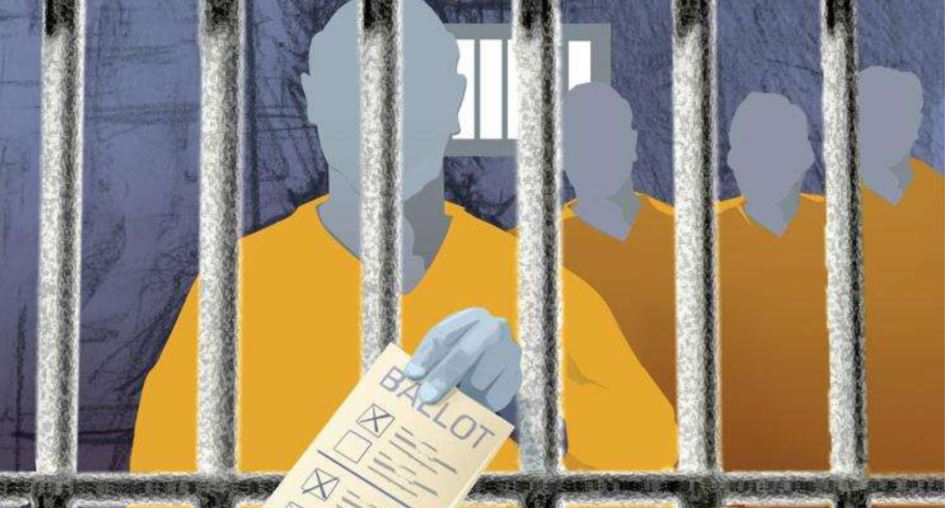Article 21 of the Universal Declaration of Human Rights states that everybody has the right to participate in the governance of their country, directly or through freely chosen representatives. Suffrage is a civil right which provides the right to vote in elections.
In India according to the National Criminal Record Bureau, out of the total population, 5,73,220 prisoners were in prisons on 31st December 2022. In addition to this, Article 25 of the International Covenant on Civil and Political Rights stipulates that each subject should have rights and opportunities, and must not be concerned under Article 2, i.e. race, color, sex, language, religion, politics, or alternative opinions, national or social origin, property status, birth, or other conditions. The Universal Declaration of Human Rights (UDHR),in Article 21(3), states that “The will of the people shall be the basis of the authority of government,” emphasizing the importance of the right to participate in governance.
JUDICIAL PERSPECTIVE ON PRISONERS’ VOTING RIGHTS IN INDIA
Based on the rights of the accused as outlined in Article 21 of the Indian Constitution, the Indian courts have made various decisions about the right to life for prisoners. In various cases heard by both the Supreme Court and High Courts, voting rights for prisoners were denied.
In Praveen Kumar Chaudhary v. Election Commission & Ors case, three law students had filed a petition before the Delhi High Court to challenge the constitutional validity of Section 62 (5) of the Representative of People Act which does not provide the right to vote to the prisoners and was against the right to equality under Indian Constitution, therefore, they pleaded the court to quash the said section. The Court dismissed the petition based on precedents of petitioners who pointed out that no differentiation or categorization between prisoners who are in prison or on bail or are released from jail is made by the Government. Further, contention was made that the choice of contesting election is given to the person even if he is in jail but he is denied his voting right while he is in jail. The petitioner also pleaded that the prisoners be provided with suitable facilities and services to cast votes from the prison itself. Therefore, the Supreme gave a detailed explanation for denying the right to vote to the prisoners.
The Supreme Court held that the voting rights of prisoners are only statutory rights and thus, are subject to the limitations given under Section 62 (5) of the Representation of the People’s Act and they do not fall under the Fundamental Rights of the citizens under the Indian Constitution. Thus, the Apex Court held that the said section of the Representation of the People’s Act is constitutionally valid and that the categorization of a person who is imprisoned in jail or who is out of jail is also valid. A person who is imprisoned as a result of his actions and is thus denied liberty during his imprisonment cannot claim equal freedom of movement, speech, and expression as those who are not imprisoned. Separating people in and out of prison is an acceptable approach.
The Delhi High Court dismissed a PIL requesting prisoner voting rights saying that the facilities have been granted. The judgment was made at the request of three law students, Praveen Kumar Chaudhary, Atul Kumar Dubey, and Prerna Singh, to seek the right to vote for everyone in prisons across the country. Justice DN Patel and Justice C Hari Shankar referred to the Supreme Court ruling wherein the right to vote was held as a non-fundamental or a common right that it is only provided by law. The People’s Law was subject to statutory restrictions preventing prisoners from casting their votes from prison.
In Anukul Chandra Pradhan v. Union of India and Ors, Section 62 (5) of the Representation of Peoples Act was challenged and later upheld by the Court, stating that denying the right to vote to prisoners is not a violation of Article 14 and Article 21 of the Indian Constitution. Otherwise, the voting rights of prisoners are conditionally imposed by the parliament.
The Supreme Court gave several reasons for not providing voting rights to the prisoners. The Court stated that a large police and other security forces are needed to provide voting rights to the prisoners, and that is not an easy task. Secondly, prisoners are in prison because of their conduct, therefore; they cannot ask for equality in voting rights. Thirdly, keep prisoners out of elections.
Conclusion
The constitutional requirements for representative governance in India offers room for interpretations to safeguard the voting rights of its citizens. Therefore, the proposition to eliminate the provision in the Representation of People’s Act, 1951, restricting voting rights for all prisoners, including hardcore offenders, is unlikely to find favor with the Judiciary and Government.
To address the nuances of various cases, a categorization of convicts could be introduced, allowing under-trial prisoners and those convicted of minor or non-serious offenses to exercise their right to vote. Practical measures can be implemented to facilitate the enfranchisement of prisoners in India, such as establishing polling stations within prisons or providing special voting arrangements for incarcerated individuals. The Election Commission, given the controlled environment of prisons, could easily determine the eligibility of convicts to vote, ensuring fair participation. Amendments to certain sections of the Representation of People’s Act, 1951, like Sections 62 (5) and 8 (3), may be necessary to eliminate contradictions.
Upholding the principle of “innocent until proven guilty,” under trial prisoners should not be denied voting rights, considering that their guilt has not been established, yet. Given that some prisoners may spend more time in jail than their presumed sentence, restricting the voting rights of hardcore offenders seems justifiable, but not for other categories of prisoners. The international example of European countries granting voting rights to prisoners raises the question of why India does not adopt a similar stance. Recognizing the rehabilitative potential, the Law Commission of India and the Judiciary should reconsider the voting rights of prisoners in the country.
By Balram Mishra 4th Year B.A. LL.B (Hons.), Faculty of Law, The Maharaja Sayajirao University of Baroda, Vadodara

